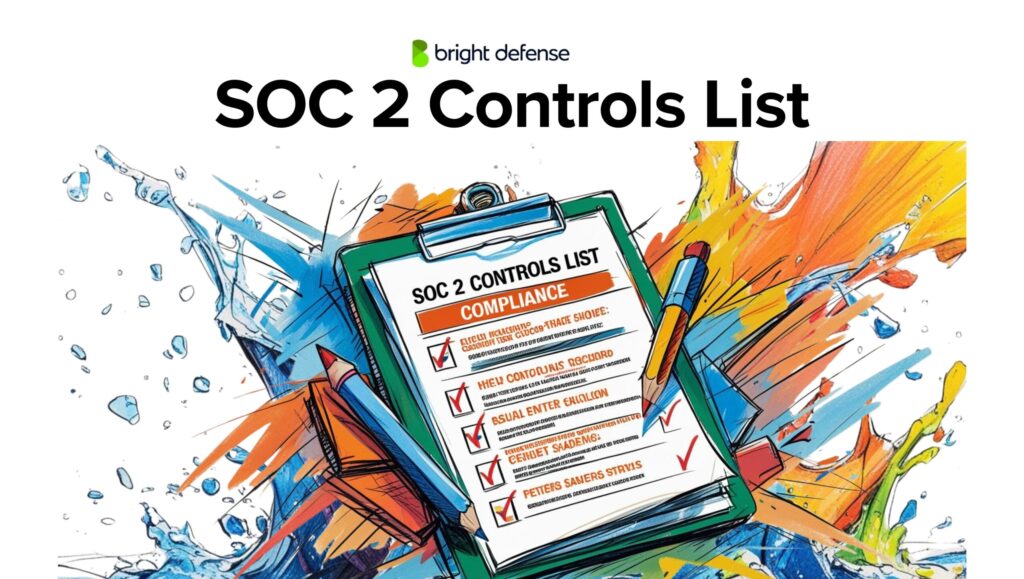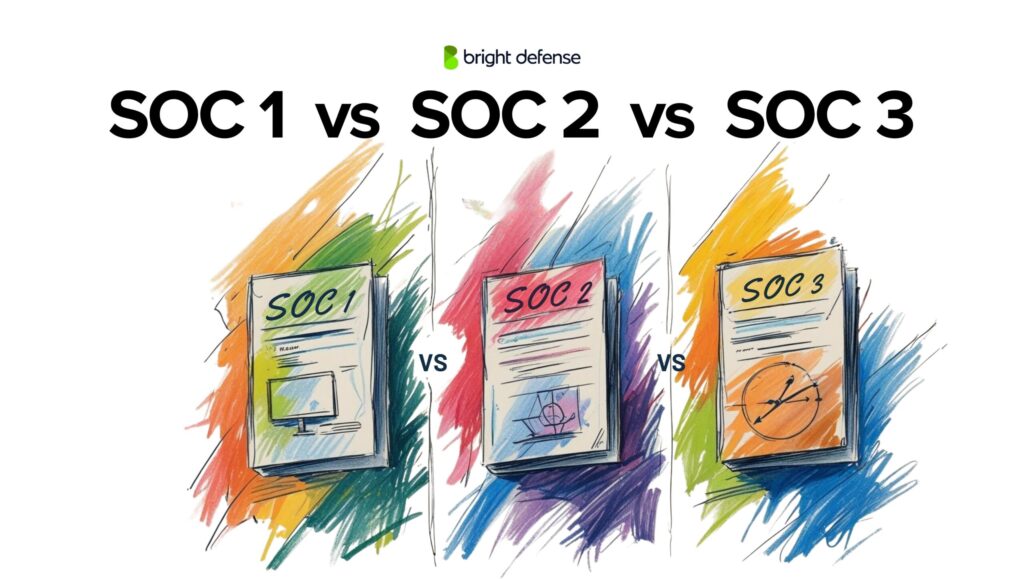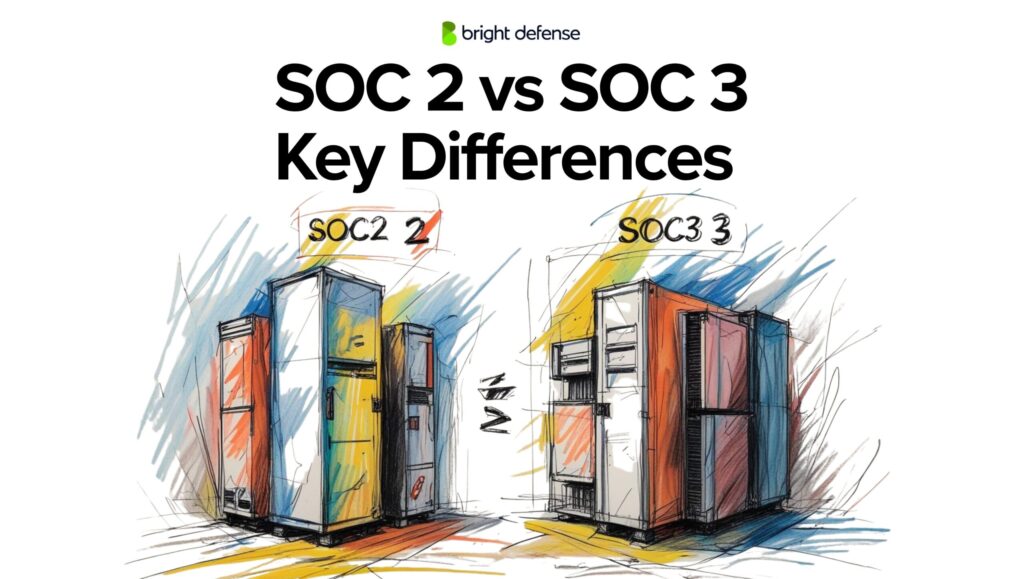
Tim Mektrakarn - CISSP | CISA | ISO 27001
June 30, 2025
What is a SOC Report and Why is it Important?
With data breaches averaging $4.88 million in losses, companies are under pressure to show they manage cybersecurity risks properly. A SOC (System and Organization Controls) report, created by the AICPA, allows a certified public accountant to evaluate how a business handles data protection, system security, and risk management.
Many clients, partners, and regulators now expect these reports. A SOC report helps prove your business follows strict controls and can be trusted with sensitive information.
What Are SOC Reports?
SOC (System and Organization Controls) reports are third-party audits that show how a company protects and manages data. These reports follow standards from the American Institute of Certified Public Accountants (AICPA) and describe the design and performance of internal controls related to security, privacy, and operational reliability.
Service providers like SaaS companies, cloud platforms, and data processors often use these reports to show customers, partners, or regulators how they handle controls. Independent CPAs or audit firms conduct the audits to provide objectivity and credibility.
There are three main types of SOC reports, each serving a different purpose:
1. SOC 1: Internal Controls Over Financial Reporting (ICFR)
This report focuses on controls that are relevant to a customer’s financial reporting. It’s most commonly used by payroll companies, payment processors, or any service that affects financial statements. There are two subtypes:
- Type I examines the design of controls at a specific point in time.
- Type II evaluates both design and operating effectiveness over a period (usually 6 to 12 months).
SOC 1 is important for auditors who need assurance that outsourced processes won’t compromise the accuracy of financial data.
2. SOC 2: Controls Relevant to Security, Availability, Processing Integrity, Confidentiality, and Privacy
This is the most relevant report for cybersecurity. SOC 2 applies to technology and cloud-based companies that handle customer data. It evaluates how systems are secured against unauthorized access, maintained for uptime, safeguarded for confidential handling, and monitored for privacy requirements.
SOC 2 is divided into:
- Type I: Evaluates the control design at a single point in time.
- Type II: Assesses how well those controls perform over a set period.
Most customers ask for the Type II version because it reflects sustained performance, not just theoretical control design.
3. SOC 3: General-Use Version of SOC 2
SOC 3 reports include the same categories as SOC 2, but they are written for a general audience and do not include detailed testing procedures or results. These are often published on company websites as proof of good practices without disclosing technical details.
Why Are SOC Reports Important for a Company’s Cybersecurity?
SOC (System and Organization Controls) reports hold critical importance for a company’s cybersecurity efforts because they offer independently verified information about how a service provider manages and protects data. Here’s a breakdown of their value:
1. Independent Assurance of Security Controls
SOC reports are issued after external auditors assess a company’s controls. These assessments follow standards set by the AICPA (American Institute of Certified Public Accountants). For cybersecurity, SOC 2 is particularly relevant. It evaluates how well a company handles:
- Security
- Availability
- Processing integrity
- Confidentiality
- Privacy
Obtaining a SOC 2 report, a company demonstrates that it has undergone rigorous scrutiny and that its controls meet established trust criteria.
2. Customer and Partner Confidence
Clients, especially those in regulated industries like finance or healthcare, often require SOC reports from vendors. A SOC 2 Type II report provides evidence that controls were not only in place, but also operated effectively over a sustained period (usually 6–12 months). This provides customers and partners with greater confidence in the company’s ability to safeguard data from breaches, misuse, or accidental loss.
3. Risk Reduction and Process Maturity
The audit process for SOC reports forces companies to define, document, and consistently apply controls. This tends to reduce operational risks because it exposes:
- Gaps in policy enforcement
- Weaknesses in access management
- Misconfigured systems
The outcome is often improved process discipline, better logging, stricter monitoring, and stronger access controls.
4. Support for Regulatory and Contractual Requirements
While SOC reports are voluntary, they help companies demonstrate alignment with mandatory regulations. For instance, a SOC 2 audit may overlap with controls required under GDPR, HIPAA, or CCPA.
As a result, companies can use their SOC report to show auditors or regulators that certain technical and organizational measures are already in place. Similarly, many enterprise customers include security requirements in contracts.
A SOC 2 report makes it easier to prove that the organization has addressed those terms, reducing friction during contract negotiations or renewals.
5. Early Detection of Security Issues
The auditing process requires companies to implement and monitor controls continuously. This includes logging access attempts, scanning for vulnerabilities, reviewing changes to critical systems, and validating incident response procedures.
When these practices are followed in preparation for a SOC 2 audit, they create a feedback loop that helps the company detect issues earlier than it otherwise might. Over time, the discipline that comes from audit readiness can lead to fewer security surprises and faster resolution of emerging risks.
What is a Service Organization?
A service organization is a business or entity that provides specific services to other entities. These services are typically outsourced functions that are part of the client’s information system. In other words, a service organization does not sell physical products but rather provides specialized services that support the operations or business processes of its clients.
Examples of services offered by such organizations include:
- Information Technology Services: This can include data hosting, cloud computing services, and other IT support services.
- Payroll Processing: Companies often outsource payroll processing to service organizations specializing in this area.
- Data Processing: This can range from data storage solutions to data analysis services.
- Human Resources Functions: Such as benefits administration or recruitment services.
- Financial Services: Like loan servicing, investment management, or trust services.
- Healthcare Administration Services: Including claims processing and patient record management.
Service organizations are significant in today’s business landscape because they allow other companies to outsource non-core but critical functions, enabling them to focus on their primary business activities. The controls and processes of these service organizations are often evaluated through SOC (Service Organization Control) reports, which assess the effectiveness and security of the services provided, especially as they relate to the client’s financial reporting and data security.

The Basics of SOC Reports
At the heart of understanding “what is SOC report” lies the need to grasp what they are and why they matter. A SOC (Service Organization Control) report is a comprehensive review that provides valuable insights into how a service organization controls and manages data. Its primary purpose is to give users a sense of security and assurance regarding the handling of their sensitive information, be it financial data, personal details, or operational specifics.
When we delve into the types of SOC reports, we uncover three distinct varieties: SOC 1, SOC 2, and SOC 3, each serving a unique function:
- SOC 1 Reports are specifically designed for service organizations that impact their clients’ financial reporting. These reports are pivotal for clients in understanding how their financial information is managed and protected.
- SOC 2 Reports take a broader perspective, focusing on five key trust service criteria: security, availability, processing integrity, confidentiality, and privacy. These reports are crucial for users who need assurance about the security and privacy of their information handled by the service organization.
- SOC 3 Reports are a more generalized version of SOC 2 reports, providing a high-level overview without the detailed controls and tests found in SOC 2. These reports are often used for general public distribution, offering a summary of how a service organization manages data with respect to the trust service criteria.
The key differences between these reports lie in their scope and audience. SOC 1 is finance-focused and relevant for financial audits, SOC 2 offers detailed insights on data management practices targeting specific trust criteria, and SOC 3 provides a less detailed, publicly accessible overview.

SOC 1 Reports
Specialized assessments, SOC 1 reports actively evaluate and report on the controls within a service organization that affect or could affect a user entity’s financial reporting. Grounded in the Statement on Standards for Attestation Engagements (SSAE) No. 18, these reports specifically focus on controls relevant to internal control over financial reporting (ICFR).
The relevance of SOC 1 reports in financial reporting cannot be overstated. For companies that outsource tasks or functions that impact their financial reporting, understanding the effectiveness of their service providers’ controls is critical. These reports offer assurance to the user entities’ management, auditors, and stakeholders that the service organization has adequate controls in place. They are essential in the context of compliance with laws and regulations like Sarbanes-Oxley Act (SOX), which requires management to certify the effectiveness of internal controls over financial reporting. By providing a detailed evaluation of the controls at service organizations, SOC 1 reports play a vital role in the broader financial reporting ecosystem, ensuring transparency and reliability in financial data handling and processing.
SOC 2 Reports
SOC 2 reports are an integral framework in the realm of data security and compliance, primarily focusing on non-financial reporting controls related to security, availability, processing integrity, confidentiality, and privacy of a system. Developed by the American Institute of CPAs (AICPA), these reports are essential for organizations that store, process, or handle customer data, ensuring adherence to rigorous standards.
SOC 2 Trust Service Criteria
The core of SOC 2 reports revolves around the five Trust Service Criteria:
- Security: This criterion assesses whether the system is protected against unauthorized access (both physical and logical). It ensures that the system is available for operation and use as committed or agreed.
- Availability: This focuses on the availability of the system as agreed upon in the contract or service level agreement (SLA). It does not set a minimum performance level but examines whether the system was available as stipulated.
- Processing Integrity: This criterion ensures that system processing is complete, valid, accurate, timely, and authorized. It’s crucial for systems involved in processing a significant amount of data where errors can have significant impacts.
- Confidentiality: This aspect deals with the protection of information designated as confidential from unauthorized disclosure. This criterion is vital for systems that handle sensitive data which is not intended for public disclosure.
- Privacy: This addresses the system’s collection, use, retention, disclosure, and disposal of personal information in conformity with an organization’s privacy notice and principles consistent with the AICPA’s generally accepted privacy principles.
The importance of SOC 2 reports in the landscape of data security and compliance is immense. They provide a benchmark for service organizations to demonstrate their commitment to these crucial aspects of information handling. In an era where data breaches and cyber threats are rampant, SOC 2 reports serve as a testament to an organization’s dedication to maintaining high standards of data protection and privacy.
Comparing SOC 1 vs SOC 2:
- SOC 1 Reports:
- Focus: Controls relevant to internal control over financial reporting.
- Audience: Auditors, clients needing assurance on financial data integrity.
- Use: Ideal for organizations handling financial transactions/reporting for clients.
- SOC 2 Reports:
- Focus: Controls related to security, availability, processing integrity, confidentiality, and privacy.
- Audience: Management, regulators, clients concerned about data security and privacy.
- Use: Suitable for organizations managing, storing, or processing any kind of information.

Type I vs Type II Reports
There are two types of SOC 1 and SOC 2 reports:
- Type I: This report provides an analysis of the fairness of the presentation of management’s description of the service organization’s system and the suitability of the design of controls to achieve the related control objectives included in the description as of a specified date. In simpler terms, a Type I report assesses how adequate the controls are designed and whether they are placed in operation on a certain date.
- Type II: This report includes everything in Type I and also includes an evaluation of the effectiveness of the implemented controls over a minimum period of six months. A Type II report not only looks at the design of controls but also their operational effectiveness over time, providing a more comprehensive view of how well the controls work in practice.
They not only help in building client trust but also ensure compliance with various regulatory requirements. Businesses heavily relying on cloud services and third-party service providers critically factor SOC 2 compliance into their vendor selection process, ensuring the utmost care and security in data handling. In summary, SOC 2 reports not only signify compliance but are a cornerstone in the foundation of a secure and reliable information technology environment.
SOC 3 Reports
SOC 3 reports provide a high-level summary of a service organization’s controls related to the same five Trust Service Criteria as SOC 2: Security, Availability, Processing Integrity, Confidentiality, and Privacy. However, the format and purpose of SOC 3 reports differ significantly from SOC 2 reports, making them accessible to a broader audience.
The general use case of SOC 3 reports is primarily for marketing and public relations purposes. Companies often use these reports to build trust with potential customers and partners by demonstrating their commitment to high standards of data security and privacy. A SOC 3 report is an effective tool for organizations to showcase their compliance with industry best practices without the need for readers to have a deep understanding of IT controls and processes. This broadens the audience reach, allowing any interested party, including customers, investors, and the general public, to gain assurance about the organization’s systems and data management practices.
Comparing SOC 2 vs SOC 3:
The comparison between SOC 2 and SOC 3 reports can be understood in terms of detail and accessibility:
- SOC 2 Reports: Provide a detailed and comprehensive description of the controls at a service organization relevant to security, availability, processing integrity, confidentiality, and privacy. These reports are restricted in distribution due to the sensitive nature of the information they contain.
- SOC 3 Reports: Offer a high-level summary of the findings of the SOC 2 report, including information about whether the organization achieved the Trust Service Criteria. These reports can be freely distributed and are often used for marketing purposes, providing assurance to potential clients and partners about the organization’s data handling practices.
Understanding SOC Report Audits
The process of conducting a SOC report audit is meticulous and involves several key steps. The service organization actively starts by defining the audit’s scope, identifying the systems and controls for evaluation. Subsequently, they engage an independent auditor, typically a CPA (Certified Public Accountant) or a firm specializing in such audits.
The role of these independent auditors is critical. They bring objectivity and expertise to the process, ensuring that the evaluation is thorough and unbiased. The auditors review and test the controls in place to determine their effectiveness in meeting the specified criteria (based on the type of SOC report). This involves a combination of procedures including inspection of documents, observations of processes, and interviews with relevant personnel.
Businesses preparing for a SOC audit need to invest time and resources to ensure their systems and controls meet the required standards. Hiring a specialized consultant has implemented Information Security programs like SOC 2 is crucial to the success. This preparation often involves:
- Conducting internal assessments or pre-audits to identify and address potential gaps.
- Implementing or refining controls to meet the Trust Service Criteria.
- Documenting processes and controls in a clear and comprehensive manner.
- Training staff and ensuring they understand their roles in the audit process.

The Importance of SOC Reports for Businesses
SOC reports hold significant value for businesses in several key areas:
- Risk Management and Building Trust: In an environment where data breaches and cyber threats are increasingly common, SOC reports provide assurance that a business is taking necessary steps to protect sensitive data. This assurance is crucial not only for the business’s internal purposes but also for building trust with clients and stakeholders who are increasingly concerned about data security and privacy.
- Competitive Advantage in the Marketplace: With the rising emphasis on data security, having a SOC report can differentiate a business from its competitors. It demonstrates a commitment to maintaining high standards of data handling and security practices, which can be a decisive factor for clients when choosing between vendors or service providers.
- Legal and Regulatory Implications: For many industries, compliance with specific regulations regarding data security and privacy is not optional. SOC reports can play a vital role in demonstrating compliance with various regulations, including international standards and local laws. This compliance reduces the risk of legal and regulatory sanctions and can also mitigate the consequences should a data breach occur.
Conclusion
In wrapping up, the importance of SOC reports in today’s interconnected and digital-first business environment cannot be overstated. These reports are not merely compliance documents but are foundational in building trust, ensuring security, and demonstrating a commitment to data integrity. From the detailed evaluations in SOC 1 reports focusing on financial reporting to the comprehensive insights offered by SOC 2 and the accessible summaries in SOC 3 reports, each serves a crucial role in a business’s ecosystem. They are instrumental in risk management, competitive positioning, and fulfilling legal and regulatory obligations. However, the intricacies of SOC reports and the audit process can be complex, and the right approach may vary significantly from one organization to another.
About Bright Defense’s SOC Services
Therefore, it is highly advisable for businesses to seek professional advice to navigate this landscape. This is where Bright Defense comes in to provide tailored guidance, ensuring that your organization not only complies with the necessary standards but also leverages these reports to enhance business value and trustworthiness. If you’re looking to dive deeper into the world of SOC reports or need specific assistance, don’t hesitate to reach out our professionals who specialize in this area. They can offer invaluable insights and support tailored to your organization’s unique needs and objectives.
FAQ on What is a SOC Report
1. What is a SOC Report?
- A Service Organization Control (SOC) report is a verification performed by a third-party auditor assessing the extent to which a service organization conducts its operations in adherence to certain trust and security principles. These reports provide assurance about financial controls (SOC 1), security, availability, processing integrity, confidentiality, and privacy (SOC 2 and SOC 3).
2. What are the different types of SOC Reports?
- There are three main types: SOC 1 (focused on financial reporting controls), SOC 2 (focused on the security, availability, processing integrity, confidentiality, and privacy of a system), and SOC 3 (a public-facing summary of a SOC 2 report).
3. Who needs a SOC Report?
- Businesses that provide services which affect their clients’ financial reporting or handle sensitive data, such as cloud computing providers, payroll processors, medical claims processors, and data centers, typically need SOC reports.
4. How is a SOC Report prepared?
- A SOC report is prepared by an independent CPA or audit firm. It involves assessing the service organization’s systems and controls against predefined criteria and standards.
5. What is the difference between SOC 1 and SOC 2 reports?
- SOC 1 reports focus on controls relevant to financial reporting, while SOC 2 reports deal with controls related to security, availability, processing integrity, confidentiality, and privacy of information.
6. Who uses SOC Reports?
- SOC reports are used by stakeholders such as clients, management, regulators, and auditors to gain assurance about the service organization’s control environment.
7. How often should a SOC Report be updated?
- Typically, SOC reports are updated annually, but the frequency can vary depending on the service organization’s agreement with its clients and the changing nature of its control environment.
8. What is the importance of a SOC Report for businesses?
- SOC reports are crucial for businesses in establishing trust with clients, meeting contractual obligations, ensuring compliance with regulations, and gaining a competitive advantage.
9. Can a business prepare its own SOC Report?
- No, a SOC report must be prepared by an independent auditor or a CPA firm to ensure objectivity and credibility.
10. How long does it take to complete a SOC Report?
- The time frame varies depending on the scope of the audit and the readiness of the service organization but typically ranges from a few weeks to several months.
Get In Touch



